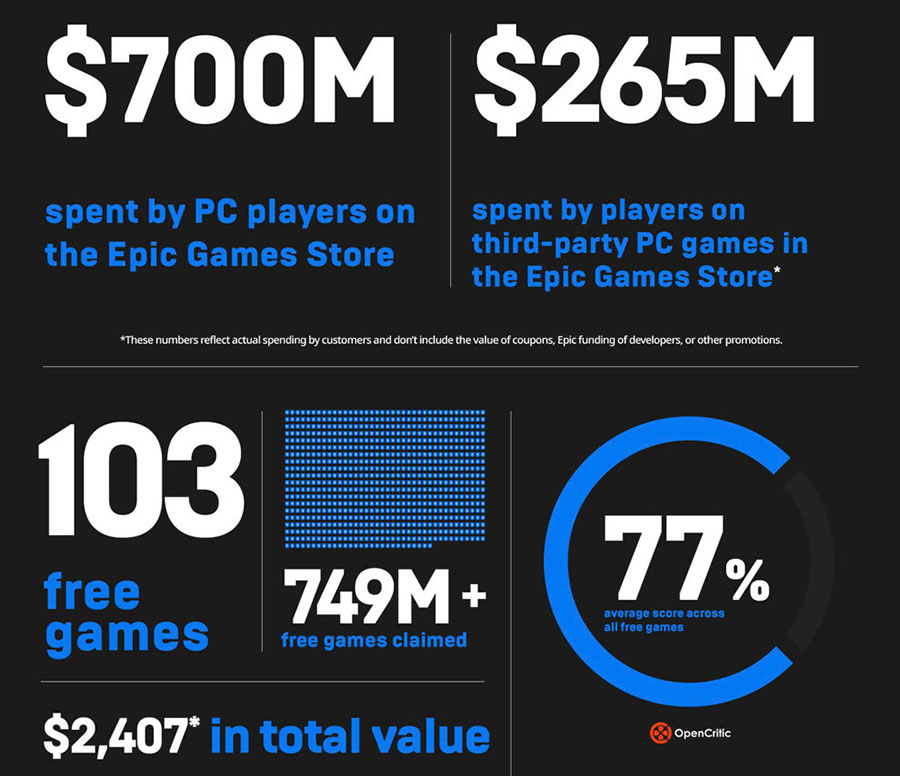Epic Games is an American video game and software development company. The company was founded in 1991 by Tim Sweeney, and its headquarters are located in Cary, North Carolina. Epic Games is best known for developing popular video game franchises such as Unreal, Gears of War, and Fortnite.
Epic Games started out as a game development studio, creating popular games such as Unreal Tournament and Gears of War. However, the company has since expanded its operations to include game engine development, online game distribution, and software development. In 1998, Epic Games released the first version of the Unreal Engine, a game engine that has since become a widely used tool in the video game industry. The Unreal Engine is known for its advanced graphics and physics capabilities, as well as its user-friendly interface.
In recent years, Epic Games has become particularly well known for its battle royale game Fortnite, which has become one of the most popular video games in the world. Fortnite has attracted a massive following due to its unique gameplay mechanics, colorful graphics, and frequent updates that add new content and game modes.
In addition to its game development and engine development operations, Epic Games also operates the Epic Games Store, an online game distribution platform that competes with other popular platforms such as Steam and GOG. The Epic Games Store offers a curated selection of games from a variety of developers, as well as exclusive games that are only available on the platform.
Overall, Epic Games is a major player in the video game industry, with a strong track record of successful game development, engine development, and software development. The company’s continued growth and success in these areas are likely to shape the future of the industry.
Exploring the History of Epic Games
Epic Games has been around for over 30 years. The company was founded in 1991 by Tim Sweeney, who is still the CEO of the company to this day. Over the years, Epic Games has become one of the most successful video game developers in the industry, with a portfolio that includes some of the most popular games of all time.
Early Years (1991-1998)
In the early years of Epic Games, the company primarily focused on developing games for PC platforms. Some of the company’s earliest titles include ZZT, Jill of the Jungle, and One Must Fall: 2097. These games helped to establish Epic Games as a major player in the PC gaming market and set the stage for the company’s future success.
During this time, Epic Games also began developing its first game engine, which would eventually become the Unreal Engine. The engine was designed to help developers create 3D games with advanced graphics and physics capabilities. This was a significant development in the industry, as it allowed developers to create more complex and immersive gaming experiences than ever before.
Rise to Prominence (1999-2007)
In 1999, Epic Games released the first version of the Unreal Engine, which was used to develop the company’s next major game: Unreal Tournament. The game was a huge success and helped to establish Epic Games as one of the leading game developers in the industry.
Over the next several years, Epic Games continued to develop and refine the Unreal Engine, which became one of the most widely used game engines in the world. The company also released several successful games, including Unreal Tournament 2003, Unreal Tournament 2004, and Gears of War.
In 2006, Epic Games made a major announcement that would change the gaming industry forever: the company was developing a new game called Fortnite. The game was originally intended to be a cooperative survival game, but later evolved into a battle royale game that would become one of the most popular games of all time.
Expansion and Growth (2008-2018)
In 2008, Epic Games released the first version of the Unreal Development Kit, which allowed developers to create games using the Unreal Engine for free. This helped to further establish the Unreal Engine as the industry standard for game development and made it more accessible to smaller developers.
Over the next several years, Epic Games continued to expand its reach and diversify its revenue streams. The company developed games for a variety of platforms, including mobile devices and consoles, and also began licensing the Unreal Engine to other developers.
In 2014, Epic Games announced that it was developing a new digital distribution platform called the Epic Games Store. The platform would compete with other major game distribution platforms, such as Steam and GOG, and would offer a curated selection of games as well as exclusive titles that would only be available on the Epic Games Store.
Recent Developments (2019-present)
In 2019, Epic Games made headlines when it announced that it would be launching a new version of the Unreal Engine that would support real-time ray tracing. This was a major development in the industry, as ray tracing is a technique that allows for more realistic lighting and shadows in games.
In addition to its game development and engine licensing businesses, Epic Games has also become a major player in the esports industry. The company has hosted several high-profile esports tournaments for games such as Fortnite and has also launched a new esports organization called the Fortnite Champion Series.
Business Model of Epic Games
One of the key factors in the success of Epic Games is its business model, which has helped the company to generate significant revenue and expand its reach. In this article, we will take a closer look at the business model of Epic Games and what sets it apart from its competitors.
Diversified Revenue Streams
One of the key features of Epic Games’ business model is its diversified revenue streams. The company generates revenue from several sources, including game development, game engine licensing, and the Epic Games Store. This approach has allowed Epic Games to reduce its reliance on any one product or service, which has helped the company to weather market fluctuations and remain profitable over the long term.
Game Development
Epic Games’ primary revenue stream comes from game development. The company has a track record of developing successful game franchises, including Gears of War, Unreal Tournament, and the hugely popular Fortnite. In addition to developing its own games, Epic Games also partners with other developers to publish and promote their games. This approach has helped to establish Epic Games as a trusted partner in the gaming industry and has allowed the company to expand its reach beyond its own titles.
Game Engine Licensing
Another key revenue stream for Epic Games is the licensing of its game engine technology. The Unreal Engine is one of the most widely used game engines in the world and powers a huge number of games across various platforms. Epic Games licenses the Unreal Engine to other developers and charges a royalty fee based on the revenue generated by the games. This approach has helped to establish Epic Games as a leader in game engine technology and has generated significant revenue for the company.
Epic Games Store
The Epic Games Store is a digital distribution platform that sells games from a variety of developers. The store competes with other major platforms such as Steam and GOG and offers a curated selection of games, as well as exclusive titles that are only available on the Epic Games Store. In addition to generating revenue from game sales, the Epic Games Store also offers a revenue share program for developers, which has helped to establish the platform as a developer-friendly alternative to other game distribution platforms.
Strategic Partnerships
Another key element of Epic Games’ business model is its strategic partnerships. The company has partnered with other developers, hardware manufacturers, and content creators to expand its reach and generate revenue from new sources. For example, Epic Games has partnered with Microsoft to bring its games to the Xbox platform and has partnered with NVIDIA to optimize its games for the latest graphics card technology.
In addition to traditional partnerships, Epic Games has also established itself as a leader in cross-platform gaming. The company has developed technology that allows players on different devices to play together seamlessly, which has helped to expand the reach of its games and has made them more accessible to players around the world.
Innovative Marketing Strategies
Finally, a key component of Epic Games’ business model is its innovative marketing strategies. The company has been able to generate significant buzz and excitement around its games through clever marketing campaigns and social media engagement. For example, Epic Games has partnered with popular streamers and YouTubers to promote its games, which has helped to reach a wider audience of gamers.
In addition to traditional marketing tactics, Epic Games has also been able to leverage the power of social media to promote its games. The company has a strong presence on platforms such as Twitter and Instagram, where it regularly posts updates and teasers for upcoming games and events. This has helped to keep gamers engaged and excited about Epic Games’ titles.
Also Read: Electronic Arts (EA Sports) – Nurturing the Digital Artists since 1982
Growth of Epic Games
Epic Games has experienced significant growth since its founding in 1991. The company has become a major player in the gaming industry, thanks to its development of some of the most popular and successful games in the industry, including the Gears of War and Fortnite franchises. In addition to game development, Epic Games has also become a major player in the game engine and digital distribution markets, with the Unreal Engine and Epic Games Store.
Early Growth (1991-2007)
In the early years of its existence, Epic Games primarily focused on developing games for the PC platform. The company’s early titles, such as ZZT and One Must Fall: 2097, helped establish Epic Games as a major player in the PC gaming market.
In 1999, Epic Games released the first version of the Unreal Engine, which quickly became one of the most widely used game engines in the industry. This helped the company to continue to expand its reach and grow its business.
In 2006, Epic Games announced that it was developing a new game called Fortnite, which would eventually become one of the most successful games of all time.
Growth with Fortnite (2008-Present)
Fortnite was initially released in 2017 as a cooperative survival game. However, it was the addition of a free-to-play battle royale mode in September of that year that really put Fortnite on the map. The game quickly became a cultural phenomenon, with its colorful graphics, unique building mechanics, and engaging gameplay attracting millions of players.
As the popularity of Fortnite grew, so too did the success of Epic Games. In 2018, the company reported that Fortnite had generated over $1 billion in revenue. This success allowed the company to invest heavily in the development of the Unreal Engine and the Epic Games Store.
The Unreal Engine has continued to be a major source of revenue for Epic Games, as it is used by developers all over the world to create a wide range of games. The engine has been used in some of the biggest games of recent years, including Red Dead Redemption 2, Mortal Kombat 11, and Marvel’s Spider-Man.
The Epic Games Store, launched in 2018, is also an important part of the company’s growth strategy. The store offers developers a more favorable revenue split than other digital marketplaces, which has helped to attract a number of high-profile games to the platform.

Future Growth
Epic Games shows no signs of slowing down in the near future. The company has several highly anticipated games in development, including Fortnite Chapter 3 and an open-world game called Project Liberty. In addition, the company is continuing to invest in the development of the Unreal Engine and the Epic Games Store.
Epic Games has also recently expanded into the metaverse space, with the acquisition of ArtStation, a platform for artists, and the establishment of the MetaHuman Creator, a tool for creating realistic human characters.
Overall, Epic Games’ growth can be attributed to its ability to create highly engaging and successful games, as well as its focus on the development of industry-leading tools and platforms like the Unreal Engine and Epic Games Store. As the gaming industry continues to grow, Epic Games is well-positioned to continue its success and remain a major player in the industry.
To read more content like this, subscribe to our newsletter




